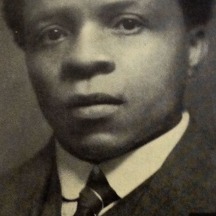With only a primary school education, Sol Plaatje established a bilingual newspaper and co-founded Africa's oldest surviving political organization, the African National Congress (ANC) in 1912. He was also the first Black South African to write an English novel and the first African to translate Shakespeare into an African language, Setswana. He also exchanged letters with African-Americans WEB Du Bois and RR Morton, who was the second principal of Tuskegee Institute, after the death of founder Booker T. Washington.
“His efforts into developing our language into a written language interested me the most,” says Sabata-mpho Mokae, our next Port of Harlem Podcast guest. After learning more about Plaatje, the academic, novelist, and translator began seeing language as a way of knowing rather than just a tool to communicate.
When one potential reader asked why he didn’t publish the book in an international language. The professor of Setswana replied, “Setswana is spoken not only in South Africa, but three other countries, all which require me a passport to visit.”
“When I was a journalist in Johannesburg around 2006, I came to Kimberley (known for its 19th-century diamond mines) to write about Sol Plaatje,” recalls Mokae. “I started reading up everything about him and by him. My interest was sparked by his genius,” he continued. At that time the city of Kimberley and Plaatje’s family were debating how best to preserve his legacy.
In time, the former writer-in-residence at the University of Iowa-USA, found himself to be the “go to” person on anything Sol Plaatje as the university in Kimberley was named after Plaatje. Mokae also became one of the university’s first professors and taught creative writing. As one would expect, Mokae developed and taught not only in English, but in Setswana.
Features


2023 marks 50 years since the first publication of Plaatje’s war diary, "The Mafeking Diary of Sol T. Plaatje." Mokae wrote the foreword in the 50th anniversary edition of the Diary, which is co-edited by Harvard professor John Comaroff and Mokae's colleague at Sol Plaatje University, Brian Willan.
The Diary was published in 1973, forty-one years after Plaatje’s death. It is the only Black account of the Anglo-Boer War (1899 - 1902), which was initially perceived to be a White man's war, between the British and Dutch descendants or Boers. His diary proved Black participation in the war.
Mokae’s work with Plaatje’s writing seems never ending. He also edited a Setswana biography of Sol Plaatje, which was written in the 1960s by his mentee, Dr. Modiri Molema. The author has since died and the biography never published until 2012 when it was translated into English. In April 2023, it will be released for the first time in the language in which it was written: Setswana.
Setswana is spoken not only in South Africa, but in Botswana, and parts of Namibia. It is the national language of Botswana and one of the eleven official languages in South Africa.
Mokae recently published a novel “Moletlo wa Manong" (Feast of the Vultures) in Setswana. When one potential reader asked why he didn’t publish the book in an international language. The professor of Setswana replied, “Setswana is spoken not only in South Africa, but three other countries, all which require me a passport to visit.”
The Diary was published in 1973, forty-one years after Plaatje’s death. It is the only Black account of the Anglo-Boer War (1899 - 1902), which was initially perceived to be a White man's war, between the British and Dutch descendants or Boers. His diary proved Black participation in the war.
Mokae’s work with Plaatje’s writing seems never ending. He also edited a Setswana biography of Sol Plaatje, which was written in the 1960s by his mentee, Dr. Modiri Molema. The author has since died and the biography never published until 2012 when it was translated into English. In April 2023, it will be released for the first time in the language in which it was written: Setswana.
Setswana is spoken not only in South Africa, but in Botswana, and parts of Namibia. It is the national language of Botswana and one of the eleven official languages in South Africa.
Mokae recently published a novel “Moletlo wa Manong" (Feast of the Vultures) in Setswana. When one potential reader asked why he didn’t publish the book in an international language. The professor of Setswana replied, “Setswana is spoken not only in South Africa, but three other countries, all which require me a passport to visit.”
Advertisers | Contact Us | Events | Links | Media Kit | Our Company | Payments Pier
Press Room | Print Cover Stories Archives | Electronic Issues and Talk Radio Archives | Writer's Guidelines






